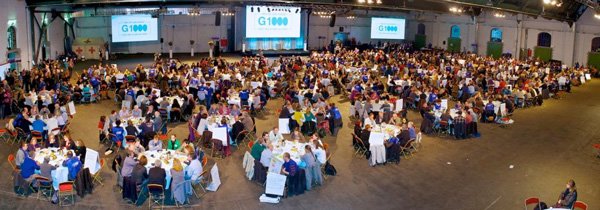
Since I’ve been increasingly devoting my time to initiatives that aim to upgrade Democracy various people have contacted me asking how they might be able to get involved and make a difference.
So this article is for people who are fed up with our current systems of democracy and who feel that (rather than simply putting a cross on a ballot sheet every few years) the way forward is much greater citizen involvement, using physical spaces and digital platforms in which people can co-create how we collectively govern ourselves.
Back in May of this year I did a Skype interview with Manuel Arriaga, the author of Rebooting Democracy. In this interview (see video below) Manuel outlines problems with present systems of representative democracy:
- Corruption
- Politicians often being power hungry individuals
- Powerful wealthy lobbies (corporations, banks) represented more than citizens and interfering with elections
- A distant political class which is not truly representative of the larger population
- Power delegated to politicians without sufficient checks and balances.
- The party political system itself that divides populations into competing tribes
One of the key solutions Manuel presents for Rebooting Democracy is Citizen deliberation.
And when we got to that point in the discussion it became clear that it’s not immediately apparent how ordinary people can get involved to make more of this happen.
For those that are interested in getting involved in conventional politics there’s an array of interest groups and political parties that you can become part of to push forward your particular point of view. But if you see the need to upgrade how we do democracy itself as a non-partisan system that enables us to make the best possible collective decisions then it may not be immediately apparent how you can make a difference.
So this article outlines a number of ways in which you can roll up your sleeves and get involved!
Perhaps the first thing to mention is despite an increase in interest for more participatory styles of politics, it’s still something that’s in it’s infancy. By getting involved you will be pioneering to some degree which requires developing a very particular mindset. So firstly it’s all about getting informed, reading up on what’s already happening and getting to understand the field of participation and public engagement.
A really useful resources for this is Participedia which crowdsources, catalogues and compares participatory political processes around the world.
Secondly it might feel like the only way to change democracy is through being a politician or a member of the political classes. You might think you need to have studied political science or have intricate knowledge of right or left wing ideology.
I’d like to debunk this myth which I feel many of us have. Politics is about how we conduct and create impact on our everyday lives. It’s something that is relational and down to earth and I feel it’s time for ‘ordinary people’ to reappropriate it as such. Our lives have been shaped by very hierarchical systems which means we often buy into the limiting beliefs of “Who am I to make a difference here? I’m not important. It’s the powerful that run things around here, not me.”
However the times are changing and the internet age is opening up huge possibilities for us to network and contribute where we feel called to do so. Therefore if you see people creating inspiring innovations in democracy reach out to them. Send an email and ask to have a conversation about what they do and to get ideas about where your contribution might fit in. I’ve been doing this for a while now and learning so much through direct human conversation.
Working from a grassroots level requires having a D.I.Y, “anything is possible” attitude and a mindset of relationship building and getting in touch with all kinds of people at different levels.
In Belgium and Holland the incredible G1000 events are created by volunteers who network and bring in the local councils to convene large numbers of randomly selected citizens who then work together to co-create ideas and proposals for their local areas.
By getting in touch with G1000.nu or G1000.uk you can find out about an entire methodology for creating “whole system conversations” where all the diversity of a town or community can come together to work on local issues.

On a smaller scale there is the possibility of creating Wisdom Councils in which mini-publics of 12-20 very diverse citizens come together to work on questions of collective concern.
It’s important to understand is there are 2 broad approaches towards more deliberative forms of democracy. The first is a bottom-up approach in which you work from a grassroots or activist level and try to bring the political class (or the powers that be) into the conversation. The second is working with those already in political positions to create inclusive initiatives.
Whatever is created (either at a grassroots or institutional level) it’s always important to give a clear idea of what will happen with the outcomes of the work that the citizens do. For example: will the proposals be implemented by the governing powers, used only for consultation or simply ignored? Framing clear reasons for the people coming together to deliberate is vital, otherwise the participants can feel used or that their time is being wasted.
Another approach to rebooting democracy is by standing as an independent councillor with the intention of opening up local government to direct citizen participation. This is what a group of people in Frome, Somerset did and they ended up taking control of the local council. Peter MacFadyen has described in detail how this can be replicated in the book Flatpack Democracy, A DIY guide to creating independent politics.
The village of Saillans in southern France has also pulled off a similar democratic revolution by getting a group of citizens elected as “the Mayor” and introducing inclusive, participatory structures for getting things done in the municipality. Here’s an article sharing their experience.
This French town is now experimenting with Sortition which basically means inviting randomly selected citizens into a facilitated space to work on collective issues. It’s a method that has been used since ancient times in Athens. It’s gaining in popularity again as a way to not only include people but also give them a taste of civic action and collaboration, which often proves to be a transformational experience. The G1000s and Wisdom Councils use this principle too. To find out more and get involved in supporting its growth in democracy take a look at what the Sortition Foundation is up to.
Supporting public engagement charities that work to advise all kinds of institutions on how to include the voices of the public is another way to move things forward. In the UK Involve works to make politics, government and society more open, participatory and deliberative and in the US the Jefferson Center and Healthy Democracy do similar work.
Working on convening democratic innovations with a group of volunteers can be a great project to pursue but it may sometimes be difficult to know where to start and how to structure your initiative. To help with this I recommend following the free online U.Lab course which is an “introduction to leading profound social, environmental and personal transformation.” It provides a complete methodology for systemic social change and plenty of concrete ways in which you can link up with others interested in the same field. A new course starts soon in mid September 2017.
Another great online resource is the Wise Democracy Pattern Language which provides tools, principles, and in depth knowledge of what needs to be taken into account to create wise collective outcomes for long term and broad benefit. A group can download and print out the pattern language as a deck of cards that can be used to help plan and design any project.
In general this new emerging field of relational democracy is built upon real conversations between people of diverse backgrounds and perspectives. Developments in the fields of facilitation and mediation mean that we do have social innovations that know how to elicit common ground and shared proposals, even between people that seem to be completely opposed to each other. So getting informed or even training in these facilitation methods can be really useful in the work to create an entirely new participatory paradigm of democracy.
Check out the Art of Hosting and Dynamic Facilitation who run fantastic workshops in ways of facilitating that are appropriate for eliciting collectively intelligent outcomes.
If you have writing, video or blogging skills why not get to work spreading the news and amplifying the great initiatives that are happening around the world? Patrick Chalmers book and work, Real Democracy Now podcast and my Reinventing Democracy channel are examples of this.
As far as rebooting our systems of democracy are concerned my knowledge is mainly in the sphere of convening spaces of public deliberation and discussion. However there is also a whole field centred on developing Digital tools for transforming political engagement. If this is more your thing then click on that page for ideas on how to get involved!
My closing note on all this is that efforts to change our outdated democratic systems can feel very slow at times and require a lot of energy and persistence. However if you understand the need and how deeply important it is for us in these times of global scale crises to improve our collective decision making and how much more fun and life affirming the relational model of democracy is then the effort will come naturally.
You will also need to support yourself as you devote time and energy to these things that can be time consuming. This can be challenging if you don’t have the financial resources or a well paid part time job. My personal response to this situation is to see to what extent I can be supported through crowdfunding. I’ve set up this fund here which outlines the projects I’m undertaking. So supporting me could be another way of helping to reboot democracy!
So it’s over to you with your rebooting efforts and do get in touch if you have any questions. Good luck!
Andy Paice is London based Coach, Facilitator and Mindfulness trainer. The focus of his work/play is facilitating and catalysing new ways of working and living that are fit for the realities of the 21st century. One of his major passions is the creation of participatory democracy initiatives and amplifying awareness of new politics through the
Reinventing Democracy YouTube channel . He teaches Mindfulness in community and corporate settings and facilitates community meetings. Andy is passionate about authentic human connection and the emerging collaborative commons paradigm. Prior to these activities he lived and practised as a monastic in the Tibetan Buddhist tradition in France from 1998-2007 where he accomplished a traditional three-year group meditation retreat. In his spare time he enjoys Contact Improvisation dancing, eating curry and running From Me to We a meetup group he created. You can check out his website www.andypaice.net and follow him on Twitter @andypaice












